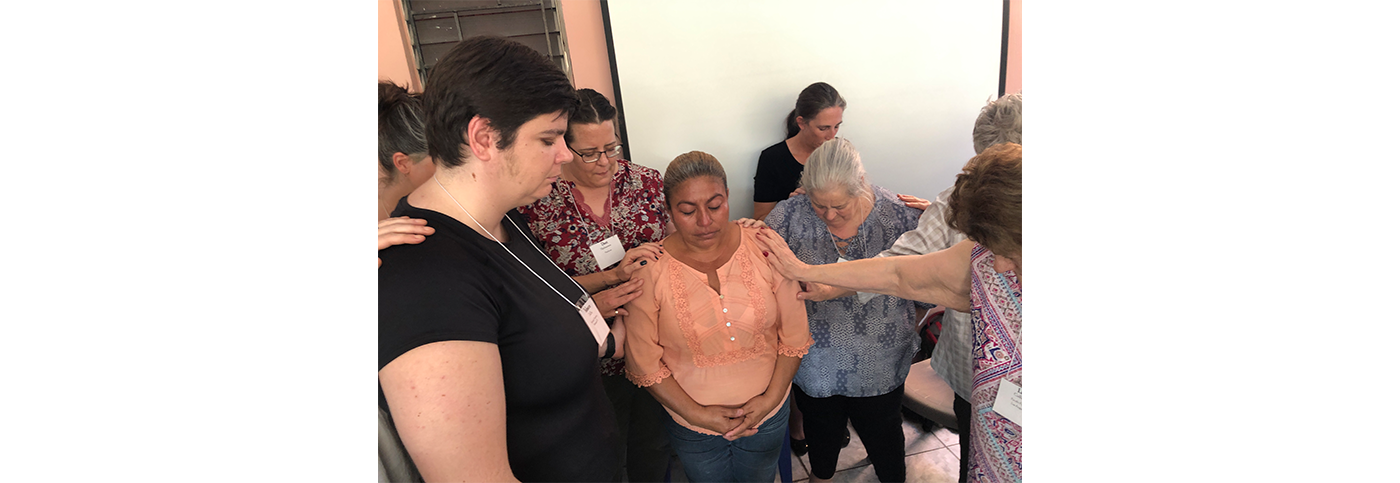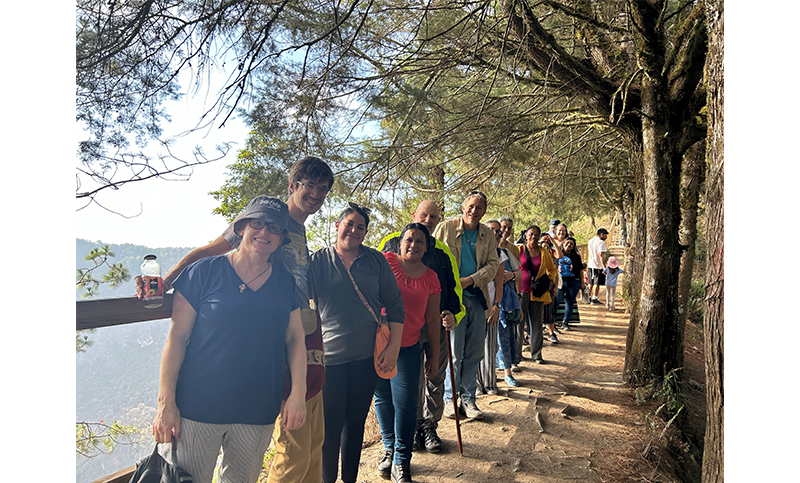Peace & Global Witness
Ministering to migrants on the brink of despair
Peace & Global Witness Offering helps bring migrant rights advocates to El Salvador to learn and take action
The plight of the thousands of migrants in her native El Salvador keeps Carmen Elena Díaz awake at night.
“Knowing their experiences, their stories, and in ministering to the migrant people, my life has been transformed,” said Díaz. “Their stories mark you, transform you, sensitize you. They make you realize what a hard and difficult subject this is.”
And migration is a subject that Díaz knows all too well.
As an executive committee member and coordinator of the Educational Ministry for the Calvinist Reformed Church of El Salvador (IRCES), Díaz helps to coordinate her denomination’s migrant ministry with scores of deported and displaced people.
Addressing the terror and pain of migrants in a country characterized by high rates of violence, political volatility, high unemployment and escalating poverty entails looking not only at immediate solutions but also at these and other root causes of migration that have led so many in El Salvador to flee their homeland.
“Not only are we trying to improve the living conditions of the people who are migrating, but it also causes us to want people not to migrate — to look for and work on the causes and work so that we reduce migration in some ways,” said Díaz, a former PC(USA) International Peacemaker whose training includes psychosocial care and psychotraumatology. “For us, the most important thing is that people do not migrate; that they do not leave.”
Joseph Russ, who works in close partnership with Díaz and her IRCES colleagues, serves as Presbyterian World Mission’s coordinator for migration issues, advocacy and mission in the Northern Triangle of Central America (El Salvador, Honduras and Guatemala). Appointed in 2022 as a result of an overture passed by the 223rd General Assembly (2018), Russ has since dedicated himself to building bridges between different organizations and strengthening advocacy efforts in the region.
“Together, diverse organizations work to build a society that better respects human rights,” said Russ. “They work for a future where people can stay in their countries of origin, where those that do migrate can have their rights respected when they do, and those who are returned can reintegrate themselves into their countries of return."
Speaking to the important role that the church plays in the region, Russ said that IRCES has woven a culture of peace into informal education opportunities as well through youth programs, psychosocial support groups and community building.
“Through a shelter program for internally displaced persons and returnees — run in collaboration with the International Red Cross Committee — the church reduced people’s exposure to violence and poverty and helped people find stability in the midst of some of the most difficult situations they have ever faced,” added Russ. “Finally, through community farming programs, the church supports local communities to develop sustainable agriculture in the face of climate change without relying on large corporations or inorganic fertilizer. This helps people live sustainable lives through healthier foods for their own consumption and the opportunity to generate income.”
Such efforts — including the March 2024 launch of the Central America Migration Mission Network (La Red de Misión y Migración en Centroamérica) with an inaugural conference in El Salvador — are made possible, in part, by gifts to the Peace & Global Witness Offering.
Traditionally received on World Communion Sunday, which this year falls on Oct. 6, the Peace & Global Witness Offering is unique in that half of it is directed to peacemaking and global witness efforts at the national church level to address critical issues around the world. Twenty-five percent is retained by congregations for local peace and reconciliation work, and 25% goes to mid councils for similar ministries on the regional level.
“This new network brings together organizations from El Salvador, Guatemala, Honduras, México and the United States to advocate for more just policies around migration, to educate people about migration and how to work for change, and supports the development of local community projects,” said Russ. “It brings together the ongoing efforts to address the roots of violence and sow the seeds for peace through social transformation in people's hearts and minds, in public policy and in local communities.”
According to the Rev. Carl E. Horton, coordinator of the Presbyterian Peacemaking Program, the Migration Mission Network witnesses to the cumulative impact of past Peacemaking Program efforts on PC(USA) endeavors today in migration ministry.
“For several years, International Peacemakers from Central America have visited our congregations and mid councils to share the realities of migration and the ministries of our partners in countries of origin and transit,” said Horton. “Travel Study Seminars to Central America and the Southern Border in 2020 also inspired leaders of mid councils to join the new migration mission network. Additionally, the Peacemaking Program is resourcing congregations with a new Central America curriculum based on the 2022 General Assembly policy ‘Seeking Hope Amid Despair in Central America.’”
In addition to the work of the network in advocacy and direct support for migrants, Russ said that the church is in a unique and special position to address, through pastoral support, the spiritual violence committed against migrants. Every morning of the March conference opened with devotionals facilitated by participants in the program — many of whom were migrants themselves — and closed with reflections in the evenings.
“These spaces served not only to center ourselves but also to develop spiritual and theological language and practices to understand migration spiritually and theologically and to respond meaningfully to the crises of faith arising from these experiences,” Russ said. “By building these resources and developing the field of migration theology, we can respond to theologies that demonize and hurt migrants and support life-giving, liberating discourses on God and God's people.”
Also attending the network launch — joining with partners from the Northern Triangle of Central America as well as several U.S.-based PC(USA) entities, including six presbyteries, three congregations and seven ministries — was Ruling Elder Anton Ahrens of Trinity Presbyterian Church in Topeka, Kansas, in the Presbytery of Northern Kansas.
“The conference was astounding in helping me to understand the context of migration and to hear stories of migration,” Ahrens said. “They washed my eyes to see things in a different way than I had before. To hear [a woman named] Margarita tell her story after having to decide — after her husband was gone — to migrate or not; whether she would travel with her two daughters. And the shawl being around her arms, the arms of her family, as she migrated. I cannot imagine being in that situation. And when I went to her and talked with her about that, my eyes were washed a little bit of my preconceived notions and my perceived understanding. To see a different story. The week was filled with experiences like that.”
As one of the conference’s more than 50 attendees, Díaz felt both strength and hope in such numbers.
“That is why the formation of this network is important,” she said, “to be able to articulate ourselves, and thus have more impact. The impact is less when you are working alone.”
Providing critical support for such collaborative projects of education and Christian witness as the migration network is a hallmark of the Peace & Global Witness Offering.
“Supporting the participation of the Presbyterian Peacemaking Program and connecting more than 20% of the participants in the launch of the new Central America Migration Mission Network through the International Peacemakers Program are a testament to the invaluable work of bringing people together to learn and take action,” said Russ.
Of the PC(USA)’s four Special Offerings, Ahrens said that Peace & Global Witness is the Offering with which he feels “most connected.”
“Every Offering is great and is needed, but I don’t think other Offerings give to people in the pews what the Peace & Global Witness Offering gives,” he said. “It’s empowerment for every level: local, presbytery and national.”
Published by Presbyterian News Serivce.
read more stories:
participate with us
When we all do a little,
it adds up to a lot.
The Peace & Global Witness Offering draws Presbyterians together and provides exposure to active peacemakers as well as education and resources to empower congregations and individuals to become peacemakers, themselves. These collective efforts support resources in dealing with conflict, provide nurturing reconciliation, and stand in support of our global siblings, because the peace of Christ belongs to people everywhere.







